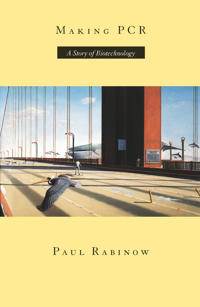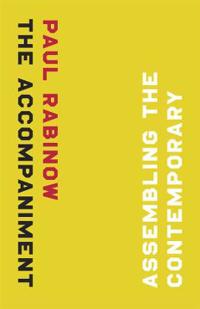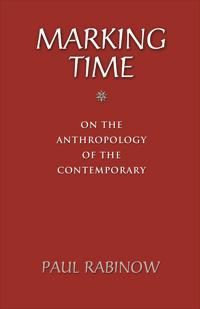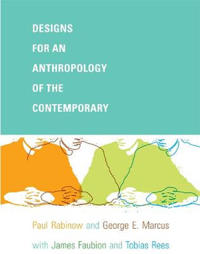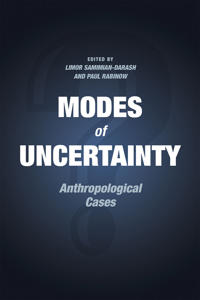Designs on the Contemporary: Anthropological Tests (Häftad)
avPaul Rabinow, Anthony Stavrianakis
ISBN: 9780226138473 - UTGIVEN: 2014-04"Designs on the Contemporary" pursues the challenge of how to design and put into practice strategies for inquiring into the intersections of philosophy and anthropology. Drawing on the conceptual repertoires of Max Weber, Michel Foucault, and John Dewey, among others, Paul Rabinow and Anthony Stavr[...]
Making Pcr (Pocket)
avPaul Rabinow
ISBN: 9780226701479 - UTGIVEN: 1997-11This is a behind-the-scenes account of the invention of one of the most significant biotechnological discoveries in our time - the polymerase chain reaction. Transforming the practice and potential of molecular biology, PCR extends scientists' ability to identify and manipulate genetic materials and[...]
The Accompaniment (Pocket)
avPaul Rabinow
ISBN: 9780226701707 - UTGIVEN: 2011-10In this culmination of his search for anthropological concepts and practices appropriate to the twenty-first century, Paul Rabinow contends that to make sense of the contemporary anthropologists must invent new forms of inquiry. He begins with an extended rumination on what he gained from two of his[...]
Reflections on Fieldwork in Morocco (Häftad)
avPaul Rabinow
ISBN: 9780520251779 - UTGIVEN: 200705In this landmark study, now celebrating thirty years in print, Paul Rabinow takes as his focus the fieldwork that anthropologists do. How valid is the process? To what extent do the cultural data become artifacts of the interaction between anthropologist and informants? Having first published a more[...]
Essays on the Anthropology of Reason (Övrig)
avPaul Rabinow
ISBN: 9780691011585 - UTGIVEN: 1996-11-25This collection of essays explains and encourages new reflection on Paul Rabinow's pioneering project to anthropologize the West. His goal is to exoticize the Western constitution of reality, emphasize those domains most taken for granted as universal, and show how their claims to truth are linked t[...]
Anthropos Today (Häftad)
avPaul Rabinow
ISBN: 9780691115665 - UTGIVEN: 200309The discipline of anthropology is, at its best, characterized by turbulence, self-examination, and inventiveness. In recent decades, new thinking and practice within the field has certainly reflected this pattern, as shown for example by numerous fruitful ventures into the "politics and poetics" of [...]
Machine to Make a Future, A: Biotech Chronicles (Pocket)
avPaul Rabinow, Talia Dan-Cohen
ISBN: 9780691126142 - UTGIVEN: 2006-03-13Marking Time (Häftad)
avPaul Rabinow
ISBN: 9780691133638 - UTGIVEN: 2007-10In "Marking Time", Paul Rabinow presents his most recent reflections on the anthropology of the contemporary. Drawing richly on the work of Michel Foucault, John Dewey, Niklas Luhmann, and, most interestingly, German painter Gerhard Richter, Rabinow offers a set of conceptual tools for scholars exam[...]
Designs for an Anthropology of the Contemporary (Häftad)
avPaul Rabinow, George E. Marcus, James D. Faubion
ISBN: 9780822343707 - UTGIVEN: 200902In this compact volume, two of anthropology's most influential theorists, Paul Rabinow and George E. Marcus, engage in a series of conversations about the past, present, and future of anthropological knowledge and practice. James Faubion joins in several exchanges to facilitate and elaborate the dia[...]
Ethics: Subjectivity and Truth (Häftad)
avMichel Foucault, Paul Rabinow
ISBN: 9781565844346 - UTGIVEN: 199805Modes of Uncertainty (Pocket)
avLimor (EDT) Samimian-darash, Paul (EDT) Rabinow, Limor (EDT) Samimian-darash
ISBN: 9780226257105 - UTGIVEN: 2015-07Modes of Uncertainty offers groundbreaking ways of thinking about danger, risk, and uncertainty from an analytical and anthropological perspective. Our world, the contributors show, is increasingly populated by forms, practices, and events whose uncertainty cannot be reduced to risk - and thus it is[...]


